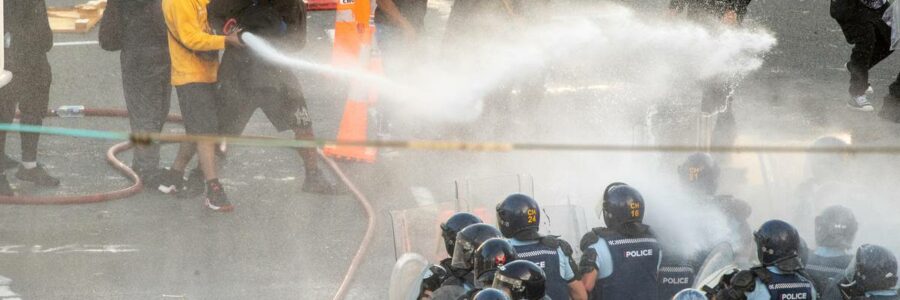
John Roughan: After the remarkable three-week stand, Andrew Coster’s shut-down of the protest was heroic
OPINION
The events outside Parliament over the past four weeks have made me immensely proud of New Zealand. Proud that we are not all of one mind, proud that dissent was tolerated for so long, proud of our police.
Dissent had 22 days, camped in the heart of the capital, occupying the hallowed grounds of Parliament and the streets around. I was surprised it lasted a week – seven nights in a tent is enough for me at the best of campsites. Two weeks was amazing, three weeks leaves me in awe of them.
It was a protest unlike any we have previously seen in this country. As far as I could see, through relentlessly negative television coverage, they were not predominantly students, Māori land claimants, trade unionists or a sexual identity group, they looked like ordinary working people who don’t normally do this sort of thing.
Some were undoubtedly cranks and many were youthful, the age group that will have felt the loss of social life more acutely than any other over the past two years.
They were the sort of people who, when they decide to do something, don’t do it by half. They weren’t going to march on Parliament and go home. They were going to stay there until something happened. After two weeks they got the Government to talk about the end of vaccine mandates. They should have declared victory then.
I’ll remember not just their determination and endurance but their skills. When sanitation became a problem and barricades prevented vehicles emptying the portaloos, they were able to build a plywood structure they called “The Peehive” and plumbed it into the city’s sewer.
They had supporters outside with resources too. Someone parked a portable shower block in the streets they commanded. It was a demonstration of Kiwi ingenuity as well as resistance to excessive government.
I was proud that a demonstrable minority of New Zealanders have not been persuaded that lockdowns and vaccine mandates are a proportionate response to this virus. Some wild and wacko theories abound from that view and there were lots of loose cannons in Parliament grounds, which makes me proud of what did not happen.
They did not try to force their way into the buildings. Had there been a serious, concerted attempt to force their way inside, we would certainly have read about it. They had the good sense to know they had nothing to gain – and a good deal to lose – by trying to emulate the idiots in Washington DC.
By remaining outside they made a much more effective statement about politicians who remained resolutely inside, Jacinda Ardern snubbing them, Grant Robertson clucking about violent placards. “King Dick” Seddon, out there on his plinth, knew how to disarm with gallows humour. Politics has become very precious.
But the police were outstanding. It takes professionalism of a high order to maintain restraint in a public stand-off with a big protest that is breaking the law in various ways, none of them very serious. It takes real strength of character to be the Commissioner of Police when you hear many calling you weak because you are not responding as hard as you could.
Andrew Coster is a hero, in my book, for the good judgment he has exercised in the face of criticism from politicians, media, and the public who think law is something to be strictly enforced at all times.
Coster would have carefully weighed up the seriousness of the illegal activity – camping where it is not allowed, parked vehicles blocking streets, scoffing at people in masks – against the likelihood that what happened on Wednesday would have been much worse had he gone hard and early.
When he decided, after three weeks, enough was enough, I suspect the protesters were relieved. They were not going to achieve much more. Most left quietly when the police arrived in overwhelming numbers on Wednesday morning.
A film will be made of this historic occupation of Parliament grounds. Police helmets, water cannons and blazing tents will provide its dramatic climax but I hope the mad parting acts of the few protesters left in the afternoon do not dominate the story.
Once the grounds were cleared, the Prime Minister addressed the nation. She was not conciliatory. She said the violence had vindicated her refusal to engage with the protest for three weeks. She said the occupation would not define us.
As Prime Minister in a pandemic, she ultimately decides just about everything we can do. She can decide to shut shops, close schools, cancel events, keep us confined to home. She even decides what is best for our health. But she doesn’t get to decide what defines us. Not all of us.
Source: Read Full Article
/cloudfront-ap-southeast-2.images.arcpublishing.com/nzme/SFHBT7O4GYH6YJSKLXG3O22U6I.jpg)
/cloudfront-ap-southeast-2.images.arcpublishing.com/nzme/23RALWSA4NGIAU5SULVDGINZVI.jpg)